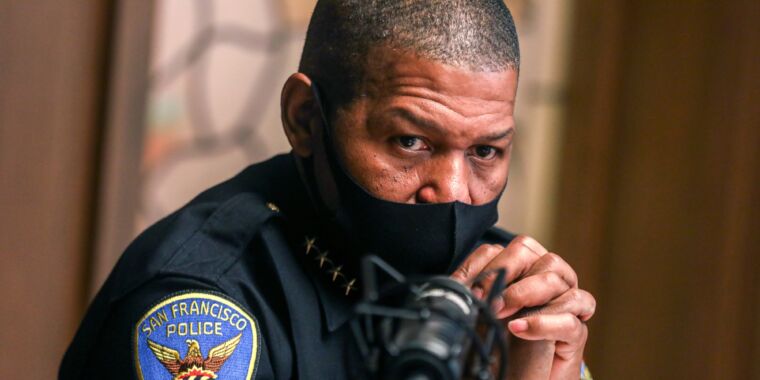
San Francisco Chronicle/Hearst Newspapers via Getty Images
San Francisco has been sued by a sexual assault victim in a complaint that describes “the San Francisco Police Department’s shocking practice of placing crime victims’ DNA into a permanent database without the victims’ knowledge or consent.”
“Plaintiff Jane Doe, a sexual assault survivor, was re-victimized by this unconstitutional practice,” alleged the lawsuit filed Monday in US District Court for the Northern District of California. “In 2016, she provided a DNA sample to the San Francisco Police Department as part of its investigation into her sexual assault. However, she never consented to it to be stored or used for any other purpose. Nevertheless, the Department maintained Plaintiff Doe’s DNA in the database for more than six years.”
According to the lawsuit, Jane Doe was arrested on burglary charges in 2021 after DNA from a crime scene apparently matched the DNA she provided five years earlier. The charges were eventually dropped.
The SFPD practice previously came to light in February 2022, as we wrote at the time. Chesa Boudin, who was then the district attorney, issued a press release denouncing the police department practice in which the “crime lab attempts to identify crime suspects by searching a database of DNA evidence that contains DNA collected from rape and sexual assault victims.” Boudin said he learned of the practice when a woman’s DNA collected years previously during a rape exam was used to link her to a property crime.
Outcry spurred changes
Under the policy, SFPD officers tested “victims’ DNA for matches in every subsequent criminal investigation in which genetic material is recovered without any reasonable basis to suspect the victims are in any way connected to these completely unrelated crime scenes,” Jane Doe’s complaint said, adding that thousands of people were reportedly “subjected to this arbitrary, unlawful unconstitutional invasion of privacy.”
Amid widespread condemnation, the SFPD reportedly ended the policy about a week after the public revelation. Because “the crime lab routinely ran crime scene evidence through this database that included Plaintiff’s DNA without ever attempting to get her consent or anyone else’s consent,” Jane Doe’s “DNA was likely tested in thousands of criminal investigations, though the police had absolutely no reason to believe that she was involved in any of the incidents,” the lawsuit said.
California’s legislature recently approved a bill on DNA collected from crime victims “requiring that law enforcement agencies use these samples only for purposes directly related to the incident being investigated, prohibiting law enforcement agencies from comparing these samples with samples that do not relate to the incident being investigated, and prohibiting law enforcement agencies from including these samples in databases that allow the samples to be compared to or matched with profiles derived from DNA evidence obtained from crime scenes.”
The bill was approved by the California Senate and Assembly and awaits Governor Gavin Newsom’s signature.








